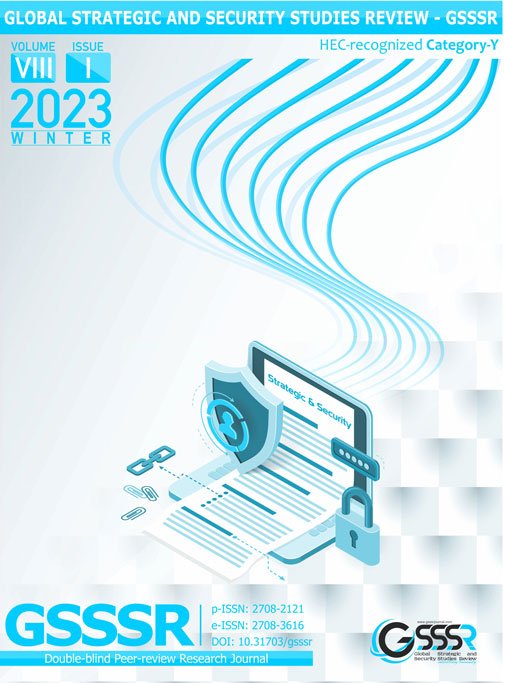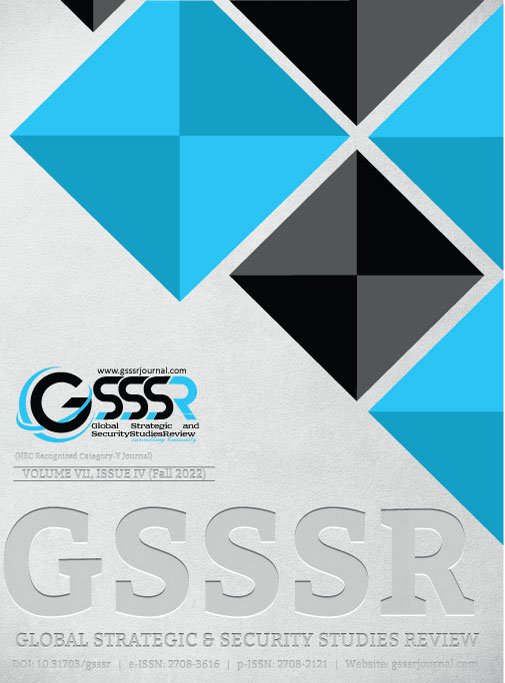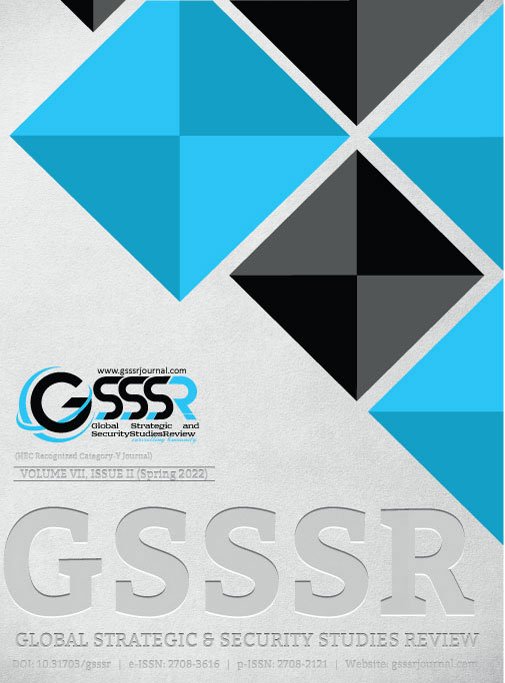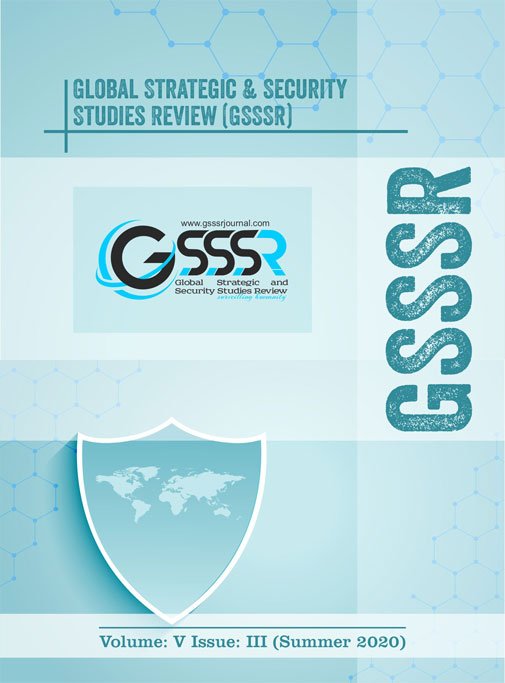01 - The Shanghai Cooperation Organization in Promoting Regional Peace and Stability:
http://dx.doi.org/10.31703/gsssr.2021(VI-II).0110.31703/gsssr.2021(VI-II).01 Published : Jun 2021
-
By looking at the institutional settings of SCO, it is believed that this organization has a huge potential to maximize cooperation and minimize conflicts among the member states. Founded under the leadership of Russia and China, SCO extended not only the opportunities and roadmaps for promoting bilateral trade and security collaborations of the mentioned countries but also helped promoted regiona... Details
-
Indo-Pak, Regionalism, Regional Peace, SCO, Shared Security, Stability
-
(1) Aamna Khan
PhD Scholar, School of International and Public Affairs, Jilin University, China.
(2) Ahmed Bux Jamali
PhD Scholar, School of International Relations and Public Affairs, Shanghai International Studies University, China.
02 - The Culture of Violent Extremism in Universities of Khyber Pakhtunkhwa: Causes a
http://dx.doi.org/10.31703/gsssr.2021(VI-II).0210.31703/gsssr.2021(VI-II).02 Published : Jun 2021
-
Violent Extremism and Radicalization is on the rise in the Universities of Khyber Pakhtunkhwa (KP). In the last decade, the crisis of students discipline has increased on campuses. Many incidents of violence and intolerance on campus are alarming for the higher education of Khyber Pakhtunkhwa. The education curriculum is insufficient to develop a mature and critical mind instead of making sectaria... Details
-
Violent Extremism, Universities, Terrorism, Radicalization, Khyber Pakhtunkhwa
-
(1) Sadia Fayaz
Assistant Professor, Department of Political Science, Shaheed Benazir Bhutto Women University Peshawar, KP, Pakistan.
03 - De-radicalization: A Case Study of Swat Valley; Its Progress, Challenges
http://dx.doi.org/10.31703/gsssr.2021(VI-II).0310.31703/gsssr.2021(VI-II).03 Published : Jun 2021
-
This research analyzes the de-radicalization process of swat, its progress, and challenges in the years 2008 to 2018. Previously Swat was fallen in the hand of terrorists and it had faced extremism and terrorism. Religious intolerance and economic issues led it to the next level of conflict.Pakistan Army initiated operations against terrorists while on the other hand, they converted the terrorist'... Details
-
De-Radicalization, Swat Valley, Rehabilitation, Counselling, Reintegration
-
(1) Sara Batool
MS in International Relations from COMSATS University Islamabad, Pakistan.
(2) Muhammad Rizwan
MS in International Relations from COMSATS University Islamabad, Pakistan
(3) Wajih Ullah
MS Scholar, Department of International Relations, Bahria University Islamabad, Pakistan
04 - Propaganda Warfare: Indian Disinformation Campaign against Pakistan
http://dx.doi.org/10.31703/gsssr.2021(VI-II).0410.31703/gsssr.2021(VI-II).04 Published : Jun 2021
-
Access to sources of information has allowed states to use media as a tool of propaganda warfare. It can be observed that within the South Asian theatre, India and Pakistan are involved in propaganda warfare, spreading disinformation campaigns with the aim to disrepute the other's international image. To understand the techniques of propaganda warfare, Edward Herman and Noam Chomsky's propaganda m... Details
-
Propaganda War, India, Pakistan, Media, Disinformation
-
(1) Sumeera Imran
Assistant Professor, Department of International Relations, Faculty of Contemporary Studies, National Defence University, Islamabad, Pakistan.
(2) Mohammad Ali Zafar
Research Scholar, Department of International Relations, Faculty of Contemporary Studies, National Defence University, Islamabad, Pakistan.
05 - Balance of Power in South Asia: Concerning Russian Role
http://dx.doi.org/10.31703/gsssr.2021(VI-II).0510.31703/gsssr.2021(VI-II).05 Published : Jun 2021
-
Russia's engagement in South Asia has been shaped by its strategic interests: its quest for warm water, the routes of its gas pipeline, and its policy for curtailing U.S. hegemony. It has always been a dominant actor of South Asian Politics. The international dynamics have changed Russian strategies at different intervals. Initially, it was inclined towards India; however, in the current scenario,... Details
-
Russia, Pakistan, India, International Dynamics, Russia-China Rapprochement, New Power Politics Game, Balance of Power
-
(1) Uroosa Ishfaq
Lecturer, Department of Political Science, Women University, Mardan, KP, Pakistan.
(2) Kashif Ashfaq
MPhil. Scholar, Department of Pakistan Studies, NUML, Islamabad, Pakistan.
(3) Saima Gul
Lecturer, Department of International Relations, University of Peshawar, KP, Pakistan
06 - Iran Pakistan Relations between Cooperation and Distrust from 2001 to 2015
http://dx.doi.org/10.31703/gsssr.2021(VI-II).0610.31703/gsssr.2021(VI-II).06 Published : Jun 2021
-
This study is qualitative research and is descriptive in nature. It starts with the cataclysmic events of 9/11 and the influence of US War on Terror on Iran and Pakistan. The war was realized by Iran and Pakistan with awe and shock. Initially, Iran cooperated the US, but soon President George Bush's fiery speech estranged Iran. While Pakistan, under duress became a front lien State in the War on T... Details
-
Iran. Pakistan, Relations, Rivalry, Terrorism, Trade, WAR
-
(1) Abdul Qadir
Assistant Professor, Department of International Relations, University of Balochistan, Quetta, Balochistan, Pakistan.
(2) Mirwais Kasi
Associate Professor, Department of International Relations, University of Balochistan, Quetta, Balochistan, Pakistan..
(3) Adil Zaman Kasi
Associate Professor, Department of Political Science, University of Balochistan, Quetta, Balochistan, Pakistan.
07 - Migrants and Growing Global Health Security Challenges after COVID-19 Outbreak
http://dx.doi.org/10.31703/gsssr.2021(VI-II).0710.31703/gsssr.2021(VI-II).07 Published : Jun 2021
-
Migrants and prevailing infectious diseases have become a more complex global challenge in the twenty-first century. Migration is a multi-faceted socio cultural phenomenon that impact has increased dramatically in the field of health and epidemic diseases. The global mobility of a person is a fundamental dynamic in the emergence of infectious diseases such as Coronavirus, TB, HIV /AIDS, Malaria, S... Details
-
Migrants, Infectious Diseases, Surveillance, Health Security, Monitoring, Early Warning COVID-19
-
(1) Muhammad Ijaz Latif
Chairman/Professor, Department of International Relations, The Islamia University of Bahawalpur, Punjab, Pakistan.
(2) Rubina Ali
Visiting Research Scholar, CSSS, Department of War Studies, King's College London.
(3) Inamullah Jan
Lecturer, Department of Politics and IR, International Islamic University, Islamabad, Pakistan.
08 - The Great Powers Interests in Afghanistan: Impacts on Pakistan Post - 9/11
http://dx.doi.org/10.31703/gsssr.2021(VI-II).0810.31703/gsssr.2021(VI-II).08 Published : Jun 2021
-
Afghanistan has a unique politico-strategic position on the world map. There are multiple reasons that always draw the attention of regional and foreign players for their national interests. The event of 9/11 again turned Afghanistan into an arena of competition for self-interests of regional and international powers. The study observes the great powers USA, China and Russia's convergence and dive... Details
-
Afghanistan, 9/11, Pakistan, USA, China, Russia, Offensive Realism
-
(1) Alia Tasleem
PhD Scholar, Department of Pakistan Studies, Bahauddin Zakariya University (BZU) Multan, Punjab, Pakistan
(2) Javed Akhtar Salyana
Professor, Department of Pakistan Studies, Bahauddin Zakariya University (BZU) Multan, Punjab, Pakistan
(3) Muhammad Shafiq
Assistant Professor, Department of History, The Islamia University of Bahawalpur (IUB), Punjab, Pakistan
09 - Terrorism and Counter- Terrorism Strategies: A Case Study of Pakistan with Speci
http://dx.doi.org/10.31703/gsssr.2021(VI-II).0910.31703/gsssr.2021(VI-II).09 Published : Jun 2021
-
Since 9/11 and the American decision to send ground forces to Afghanistan to chase and target Al-Qaeda leadership, Pakistan has seen incidents of terrorism of unprecedented magnitude. Thousands have lost their lives; while millions have been displaced, damaging the social fabric as well as hurting the economy of the country badly. In response, the government of Pakistan has deployed both soft and ... Details
-
Terrorism, National Action Plan, Military Courts, Terrorists, FATA
-
(1) Sanaullah
Demonstrator, Department of Political Science, Abdul Wali Khan University Mardan, KP, Pakistan.
(2) Brekhna Gul
Lecturer in Political Science, University College for Women, Abdul Wali Khan University Mardan, KP, Pakistan
(3) Mubasher Hassan
Independent Researcher.
10 - New Perspectives on China's Evolving Relations with Afghanistan
http://dx.doi.org/10.31703/gsssr.2021(VI-II).1010.31703/gsssr.2021(VI-II).10 Published : Jun 2021
-
Afghanistan lies within the second and third of four-concentric security circles of China and is very important as the region for stability in the western part of China. The post 9/11 periods marked by the shifts in policies generally by the world and particularly by neighboring countries of Afghanistan: China, Iran, Pakistan, Uzbekistan, Turkmenistan, India, and Tajikistan. By reviewing China's n... Details
-
China, Afghanistan, BRI, The New Neighborhood Policy, Afghan Peace Process
-
(1) Muhammad Nauman Akhter
PhD International Politics, Shandong University, China
11 - India's Quest to Establish Surgical Strikes as a New-Normal against Nuclear Paki
http://dx.doi.org/10.31703/gsssr.2021(VI-II).1110.31703/gsssr.2021(VI-II).11 Published : Jun 2021
-
This study aims to understand the rationale behind India's recent offensive approach against Pakistan. With the advent of new technologies, the conflict transformed where major wars converted into minor wars and sub-conventional warfare. Nevertheless, India introduced a new set of war fighting strategies to establish itself as a major military power in the South Asian region. The study concluded t... Details
-
India and Pakistan, Surgical Strike, New-Normal, Conflict, Nuclear Deterrence, Sovereignty
-
(1) Muhammad Saeed Uzzaman
Lecturer, Department of International Relations, National University of Modern Languages, Rawalpindi, Punjab, Pakistan.
(2) Azhar Waqar
Lecturer, Department of International Relations, National University of Modern Languages, Rawalpindi, Punjab, Pakistan.
(3) Muhammad Amin
Phil Scholar, Department of History, Quaid-i-Azam University, Islamabad, Pakistan.
12 - Role and Mandate of UNMOGIP for Peacekeeping under UNSC Resolutions on Jammu and
http://dx.doi.org/10.31703/gsssr.2021(VI-II).1210.31703/gsssr.2021(VI-II).12 Published : Jun 2021
-
The purpose of this study is to analyze the role and mandate of the UNMOGIP for peacekeeping. The UNMOGIP has been tasked to ensure peace and prevention of violations of the ceasefire line. The mechanism of UNMOGIP was part of the UN Peacekeeping. There is a need fora critical analysis of the role of the UNMOGIP in observance and reporting of CFL violations. The research paper will analyze the nat... Details
-
UNMOGIP, UN Resolutions, Peacekeeping, Line of Control, Jammu and Kashmir
-
(1) Tehmina Aslam
Director, SundarSTEM School and College, Lahore, Punjab, Pakistan.
(2) Adnan Rahman
Faculty Member, Department of Law, Faculty of Humanities and Social Sciences, University of Azad Jammu and Kashmir, Muzaffarabad, Pakistan.
(3) Saqib Shahbaz
Assistant Professor, Department of Law, Faculty of Social Sciences and Humanities, Mirpur University of Science and Technology (MUST), Mirpur, Azad Jammu and Kashmir, Pakistan.
13 - Realism: Revisiting the Concept of Power in the Age of Information
http://dx.doi.org/10.31703/gsssr.2021(VI-II).1310.31703/gsssr.2021(VI-II).13 Published : Jun 2021
-
This paper seeks to revisit the concept of power in the theoretical discourse of realism in the 21st century by taking in view the impact of information and communication technology(ICT) on international relations. The main argument is that information and communication technology has dramatically shifted the concept of power as the possession of material capabilities. The paper argues that ICT ha... Details
-
Power, Security, Traditional Security, Globalization, Realism
-
(1) Shehzad Munawar
PhD Scholar, Department of Political Science and International Relations, University of Gujrat, Gujrat, Punjab, Pakistan.
(2) Shehzada Afzal
Associate Lecturer, Department of Political Science and International Relations, University of Gujrat, Punjab, Pakistan.
(3) Ramzan Shahid
Assistant Professor, Department of Political Science and International Relations, University of Gujrat, Gujrat, Punjab, Pakistan
14 - The Expansion of the Insurgency in the Erstwhile Tribal Areas of Pakistan
http://dx.doi.org/10.31703/gsssr.2021(VI-II).1410.31703/gsssr.2021(VI-II).14 Published : Jun 2021
-
The incident of 9/11 and its aftereffects profoundly affected the security situation in Pakistan. The US and NATO forces invasion of Afghanistan on October 7, 2001 led many Al-Qaeda and Taliban operatives to take refuge in the erstwhile tribal areas of Pakistan. Pakistan army conducted military operations against the militants, but militancy initially confined to the South Waziristan expanded to t... Details
-
Insurgency, Tribal Areas, Military Operations, Expansion
-
(1) Alamgir Khan
Lecturer, Department of Political Science, University of Swabi, Swabi, KP, Pakistan.
15 - Global Climate Change: Challenges and Opportunities for Pak-Afghan Trans-boundar
http://dx.doi.org/10.31703/gsssr.2021(VI-II).1510.31703/gsssr.2021(VI-II).15 Published : Jun 2021
-
The Water and weather, which is the delicate balance between evaporation and precipitation, is the primary cycle through which climate change is sensed. Scarcities of natural resources, floods, rapidly melting of glaciers along with fast sea-level rising, and storms are worsening or changing as our climate changes, with frequently fatal consequences. Freshwater accounts for only three percent of t... Details
-
Global Climate Change, Kabul River Basin, Dictatorship, Security Threats
-
(1) Aftab Alam
Ph.D. Scholar, Center for South Asian Studies (CSAS), University of the Punjab, Lahore, Punjab, Pakistan.
16 - Sino-US Global Competitive Dynamics Post 9/11 and its Impacts on Pakistan's Secu
http://dx.doi.org/10.31703/gsssr.2021(VI-II).1610.31703/gsssr.2021(VI-II).16 Published : Jun 2021
-
In this paper we examine the security implications for Pakistan after the engagement of two powerful states, China and United States. After the incident of September 11, 2001 (9/11) and their security impacts in the capacity of Pakistan's domestic and peripheral front. Their rivalry in the 21st century at the geo strategic, geopolitical and geo-economic level have been explained on the basis of re... Details
-
Sino-US Relation, Pakistan between Sino-US Security Implication, Trade War, Pax-Americana, Pax-Sinica
-
(1) Noman Gul
Nawab Allah Nawaz Khan Law College, Gomal University Dera Ismail Khan, KP, Pakistan.
(2) Fareed Ullah
PhD Scholar, Department Of Political Science, Qurtuba University Dera Ismail Khan, KP, Pakistan.
(3) Azmat Ali Shah
Department of Political Science, Gomal University Dera Ismail Khan, KP, Pakistan.
17 - Militantsâ Strategy in Pakistan: Journey from Socio-Cultural Gaps to Narrat
http://dx.doi.org/10.31703/gsssr.2021(VI-II).1710.31703/gsssr.2021(VI-II).17 Published : Jun 2021
-
In the mid-1990s, a wave of religious extremism started in the Swat valley of northern Pakistan that turned into a violent conflict over the next decade. Generally, the phenomenon of militancy in Swat is considered to be the outcome of a powerful religious narrative that militants floated in the wake of the American war on terror in Afghanistan and Pakistan. Leaving religious extremism aside, this... Details
-
Socio-cultural Gaps, Socio-cultural Identity, Narrative of Militancy, Religious Militancy.
-
(1) Qasim Ali Shah
PhD, Scholar, Department of Development Studies, COMSATS University Islamabad, Abbottabad Campus, KP, Pakistan.
(2) Bahadar Nawab Khan
Associate Professor, Department of Development Studies, COMSATS University Islamabad, Abbottabad Campus, KP, Pakistan.

 Volume X, Issue I (Winter 2025)
Volume X, Issue I (Winter 2025)  Volume IX, Issue III (Summer 2024)
Volume IX, Issue III (Summer 2024)  Volume IX, Issue II (Spring 2024)
Volume IX, Issue II (Spring 2024)  Volume IX, Issue I (Winter 2024)
Volume IX, Issue I (Winter 2024)  Volume VIII, Issue IV (Fall 2023)
Volume VIII, Issue IV (Fall 2023)  Volume VIII, Issue III (Summer 2023)
Volume VIII, Issue III (Summer 2023)  Volume VIII, Issue II (Spring 2023)
Volume VIII, Issue II (Spring 2023)  Volume VIII, Issue I (Winter 2023)
Volume VIII, Issue I (Winter 2023)  Volume VII, Issue IV (Fall 2022)
Volume VII, Issue IV (Fall 2022)  Volume VII, Issue III (Summer 2022)
Volume VII, Issue III (Summer 2022)  Volume VII, Issue II (Spring 2022)
Volume VII, Issue II (Spring 2022)  Volume VII, Issue I (Winter 2022)
Volume VII, Issue I (Winter 2022)  Volume VI, Issue IV (Fall 2021)
Volume VI, Issue IV (Fall 2021)  Volume VI, Issue III (Summer 2021)
Volume VI, Issue III (Summer 2021)  Volume VI, Issue II (Spring 2021)
Volume VI, Issue II (Spring 2021)  Volume VI, Issue I (Winter 2021)
Volume VI, Issue I (Winter 2021)  Volume V, Issue IV (Fall 2020)
Volume V, Issue IV (Fall 2020)  Volume V, Issue III (Summer 2020)
Volume V, Issue III (Summer 2020)  Volume V, Issue II (Spring 2020)
Volume V, Issue II (Spring 2020)  Volume V, Issue I (Winter 2020)
Volume V, Issue I (Winter 2020)  Volume IV, Issue I (Fall 2019)
Volume IV, Issue I (Fall 2019)  Volume III, Issue I (Fall 2018)
Volume III, Issue I (Fall 2018)  Volume II, Issue I (Fall 2017)
Volume II, Issue I (Fall 2017)  Volume I, Issue I (Fall 2016)
Volume I, Issue I (Fall 2016)